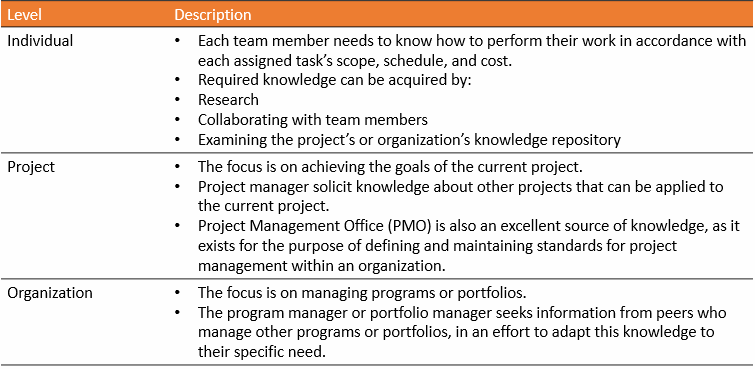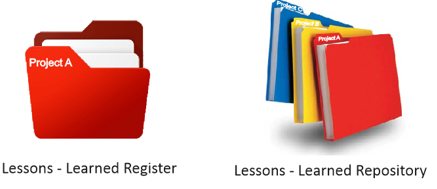Ensure knowledge transfer for project continuity
Enablers
- Maintain team and knowledge transfer. (ECO 1.6.4)
- Discuss project responsibilities within team. (ECO 2.16.1)
- Outline expectations for working environment. (ECO 2.16.2)
- Confirm approach for knowledge transfers. (ECO 2.16.3)
Deliverables, and Tools

Types of Knowledge
Explicit knowledge * is knowledge that can be codified using symbols such as words, numbers, and pictures.
- This type of knowledge can be documented and shared with others.
Tacit knowledge * is personal knowledge that can be difficult to articulate and share such as beliefs, experience, and insights.
- This type of knowledge is essential to provide the context of the explicit knowledge.
Knowledge Management
Knowledge management:
- is concerned with managing both tacit and explicit knowledge for two purposes: reusing existing knowledge and creating new
- knowledge. The key activities that underpin both purposes are knowledge sharing and knowledge integration.
- is about making sure the skills, experience, and expertise of the project team and other stakeholders are used before, during, and
- after the project.
- is creating an atmosphere of trust so that people are motivated to share their knowledge. (Even the best knowledge management
- tools & techniques will NOT work if people are NOT motivated to share what they know or to pay attention to what others know).
- In practice, knowledge is shared using a mixture of knowledge management tools and techniques (interactions between people) and information management tools and techniques (in which people codify part of their explicit knowledge by documenting it so it can be shared).
- Misconception that managing knowledge involves just documenting it so it can be shared / just obtaining lessons learned at the end of the project, in order to use it in the future projects. ONLY codified explicit knowledge can be shared in this way, but it lacks context and is open to different interpretations, so even though it can easily be shared, it is NOT always understood or applied in the right way. Tacit knowledge has context built in but is very difficult to codify.

Lessons Learned
- Knowledge gained during a project can be useful to subsequent phases of a project and to other projects.
- Both positive and negative experiences that occur throughout the project life cycle.
- "Reinventing the wheel" is both time-consuming and costly.
- The amount of time and effort used to document what went well and what did not happen as planned can pay big dividends long into the future.
Considerations of Lessons Learned
- Scheduling lessons learned
- Conflict management lessons learned
- Vendor lessons learned
- Customer lessons learned
- Strategic lessons learned
- Tactical lessons learned
- Other aspects of lessons learned
Considerations of Lessons Learned
- Auditing is an examination of a project's goals and achievements, including adequacy, accuracy, efficiency, effectiveness, and the project's compliance with applicable methodologies and regulations.
- Debriefing is a less formal, more cooperative means of discussing the positives and the negatives of the project, what worked, and what will be done differently next time.
Lessons-Learned Register
- Lessons-learned register *, which is a project document used to record knowledge gained during a project so that it can be used in the current project and entered into the lessons learned repository.
- Lessons-learned repository *, which is a store of historical information about lessons learned in projects.

Knowledge Transfer Approach
Knowledge transfer consists of connecting individuals, in person or virtually, to share tacit knowledge and collaborate together.
This can be accomplished by a number of techniques, including:
- Networking.
- Facilitating special interest groups.
- Meetings, seminars, and various other types of in-person and virtual events that encourage people to interact and exchange ideas and knowledge.
- Training that involves interaction between attendees.
- Work shadowing and reverse shadowing provide a more individualized method to the exchange of specialized knowledge.
Guidelines to Maintain Team and Knowledge Transfer
- If your organization has a Project Management Office, follow its guidelines on documenting new knowledge.
- Be alert to new sources of project knowledge, and follow the communications management plan to convey that knowledge to stakeholders.
- Proactively seek new knowledge.
- Compile a lessons-learned register throughout the project’s lifecycle, and add it to a lessons – learned repository with registers from other projects.